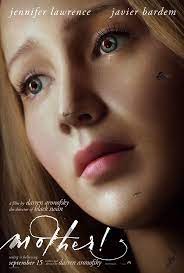Darren Aronofsky’s “mother!” is a film I had watched years ago in high school, and while it did leave me slightly traumatized, I couldn’t exactly pinpoint what the film was about. After a recent rewatch, I’m confident in saying that I understand this jarring – yet amazing – film much better now. Released in 2017, starring Jennifer Lawrence and Javier Bardem, amongst some other well-known names, “mother!” is a startling and haunting take on religion, the Bible and the environment.
At surface level, the film is a story about a couple living off the grid. There is “mother” – Jennifer Lawrence’s unnamed titular character – and her husband “Him,” portrayed by Javier Bardem. Mother spends her days renovating their home, a Victorian mansion in the countryside, as Him works on his latest novel as a failing writer. On one fateful night, a stranger named Man knocks on their door and becomes an unexpected guest for the couple. Unassuming at first, this stranger (portrayed by Ed Harris) brings along a multitude of guests into their home, including his wife, Woman (Michelle Pfeiffer), and their two sons. Mother grows increasingly frustrated and questions why Him has allowed an entire family into their fixer-upper, yet she is consistently brushed off and eventually, Man is revealed to be one of Him’s biggest fans.
The introduction of Man and Woman isn’t a plotline that should raise any eyebrows, but if one is observant enough (and slightly knowledgeable about the Bible) the couple represent Adam and Eve in the Garden of Eden, making their two sons Cain and Abel. This representation is made obvious throughout the movie in many ways. For example, in one scene, Mother realizes that Man has a severe injury on his side exactly where his rib would be. In another scene, Man and Woman are exiled after breaking a crystal in the office of Him and are seen having sex in a distant room of the house. This represents the original sin and mankind’s fall from grace after consuming the forbidden fruit, portrayed by the fire crystal in the office of Him.
While this is taking place, the couple’s two sons are arguing over Man’s will downstairs. The conversation escalates into a heated argument, and in almost picture-perfect synchronicity with the tale of Cain and Abel, the older brother severely wounds the younger as he finds out that he’s not going to receive an inheritance when his father dies. In the Bible, God rejects all of Cain’s sacrifices, and places Abel on a pedestal, resulting in Cain’s jealousy and his slaying of Abel. The film then continues with the older brother fleeing the home, and the couple alongside Him take the younger brother to a hospital where he succumbs to his wounds and dies. After they return, more and more guests enter Him and mother’s home to pay respects to the younger brother, causing mother to grow even more frustrated with the hospitality of Him. As the wake turns into a party, the guests take turns sitting on a broken sink, causing it to break off the wall. Water then pours into the house; a scene that represents humanity’s downfall after the death of Abel and then, the flood.
Mother grows more tired of Him with every passing moment, and as she voices her concern to Him, their argument turns into passionate lovemaking. The next morning, mother announces that she is pregnant with the child of Him. He is overjoyed and he begins working on his novel once again, which ends up selling extremely well. Mother prepares for a quiet and romantic dinner with Him in celebration of the novel’s success and their child. However, their date turns into a chaotic night once again, as fans of Him swarm their home to congratulate Him on the pregnancy. This is when the film transitions from the Old Testament to the New Testament, as mother and Him await the Messiah’s birth.
Mother is tormented in the moments before her child’s birth; war, poverty, assault and other hellish scenarios take place all around her. As she enters labor, Him appears out of the blue and takes mother into his office, where she gives birth to her baby boy in peace. The metaphor represents how God abandoned the Earth for long periods of time before the Messiah was born, leaving mankind to fend for themselves, no matter the lengths they would have to go to. After their child is born, Him insists on allowing his fans downstairs to meet the baby, yet mother disagrees. She soon falls asleep and Him takes the baby downstairs, where his devotees worship Him on an altar and pass the child around in a cult-like manner until he is killed. This scene may represent the meaning behind communion, as people consume bread and wine (Jesus’ body and blood, respectively) and take remembrance of what Jesus has done on the cross.
Mother awakes to find her mutilated son downstairs, and is bewildered beyond belief. She grieves; wailing and crying throughout her house as the throng of people begin attacking and beating her senseless. She is able to flee as Him finally intervenes, and mother enters the basement where an oil drum sits. Setting it on fire, mother kills herself alongside the mass upstairs while simultaneously destroying the house. Her death can be taken as an allegory for the destruction of our planet (Mother Earth,) caused by the emission of fossil fuels. Lawrence’s character as a metaphor for Mother Earth is further solidified throughout the film, as mother gets overwhelmed frequently and begins touching the walls of her home. As she presses her hand on the walls, she witnesses visions of a beating heart, growing slower and looking worse with every vision she has. The walls of her home also start cracking, breaking and even bleeding, reinforcing the notion that Earth as well as the environment is dying everyday due to overpopulation. The film ends with Him removing mother’s beating heart out of her chest; forging a new crystal and thus, creating a “new” mother. This ending informs us of director Aronofsky’s relationship with God very clearly, as Him is portrayed as a character who desires nothing more than love and admiration throughout this film – no matter how it must be achieved. Furthermore, the birth of a new Mother Earth states that his true goal is indefinite creation.
These allegories are not at all surprising when one comes to realize that they are rooted in Darren Aronofsky’s complicated relationship with God. As an atheist and an enthusiastic environmentalist, viewers can infer that this film, at its core, is a depiction of Aronofsky’s view on religion. With an antagonist (Him) that is consistently absent throughout most of the harrowing scenes, God (to Aronofsky) is a figure that was never there for him when he was needed most. The lack of care and attention toward mother represents the same lack that Aronofsky felt throughout much of his childhood, making him a staunch atheist to this day.
While this film received lukewarm reception due to its ambiguity and controversial themes, I personally enjoyed it from start to finish. Sure, it’s a horrifying film; with more than graphic imagery and haunting music; yet it was extremely interesting. It’s a very unique story, and while Aronofsky clearly states his stance on these issues, he never pushes for his viewers to feel the same way. It doesn’t force any perspectives onto his audience, and it simply exists as a criticism of religion, the Bible and the environment. My analysis may not be entirely correct, but that’s the beauty of a film as ambiguous as this; it really leaves so much up to interpretation and its subjectivity is truly something to admire.
Ashviny Kaur can be reached at [email protected].



















